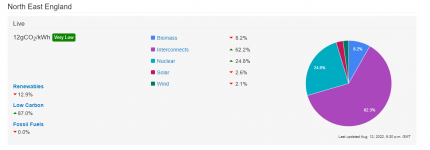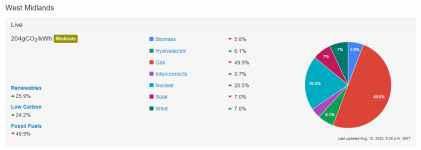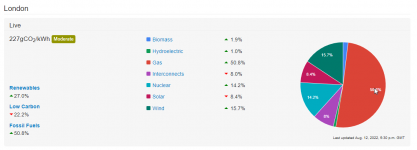r00fie1
Well-known member
You "old cynic"!As I said above is almost certainly to do with how a region tends to vote. Call me an old cynic if you must
You "old cynic"!As I said above is almost certainly to do with how a region tends to vote. Call me an old cynic if you must
I prefer the wisdom of age.You "old cynic"!
More Nuclear and more biomass in the West Midlands, which aren't cheap and less wind, less solar which are cheap? West mids further from the interconnections too, so more expensive/ more losses?I concur with your sentiments about the inadequacy of many companies involved and that "one big pot" [managed centrally] would be more efficient and preferable, but it cant explain why a concentrated urban area like Birmingham/Wolverhampton/Coventry/Walsall/Dudley is dearer than London [for example]. I suspect the foreign-owned private generation and distribution companies are ripping us off. There is always the question about where renewable energy, comes into the equation?



You gotta show you working, surely.I literally did the maths which showed an average user in north east pays less on their bill than an equivalent user in London and we are still saying it's based on how areas vote?
Like we are better off financially. Quick; arm the militia.
unit rates/standing charges are in the URL I posted and the figure are below.You gotta show you working, surely.
Unit rates also differ by area, and we have lower unit rates typically. Example above of my old supplier
I'd rather have lower unit rates than standing charges tbf as standing charges are fixed rates and unit rates escalate with usage, but it will largely balance itself out
North east using 3731 units (the average) will cost £1064.45, someone in London £1164.45 so bang on £100 more
Standing charge north east £200.45
London £135.92
Difference £64.53 less. So someone in London pays £100 more for their elec and £64.53 less for their SC
Hardly the north being ripped off imo
I saw that tfg. How are you calculating that the overall cost is cheaper in the north east? What's the average kW unit usage per day? I have no idea.unit rates/standing charges are in the URL I posted and the figure are below.
I was wondering that, the standing charge difference from like 30p to 50p is like £6 a month. That standing charge aspect is far less important than people having the cheapest rate, or a rate which is more suitable to them, like cheap overnight tariff etc.I literally did the maths which showed an average user in north east pays less on their bill than an equivalent user in London and we are still saying it's based on how areas vote?
Like we are better off financially. Quick; arm the militia.
I will probably use about 7000kW of electricity, and that's with an EV, a small amount of solar and an electric oven/ induction hob.I saw that tfg. How are you calculating that the overall cost is cheaper in the north east? What's the average kW unit usage per day? I have no idea.
No, standing charges have nothing to do with generation sources they are dictated by the cost of the transmission infrastructure in the various regions.Might be something daft to do with volts drop/ increased resistance and the grid, the further you go, the more the voltage drop/ resitance and the more losses to heat and the likes. Will also be to do with what areas are fed by which production they're closest to.
The North East is like 23% nuclear and 36% interconnections (imported electric) at the minute, and they're both going to be more expensive than any other method of production.
London for example is 50% gas at the minute, which is cheap (still, comparatively), only 11% Nuclear and 4% interconnectors.
Local DNO's will buy from the producers at whatever they sell it for (which is different), and then this gets sold to the suppliers, who then knock that on the bills.
It could be a lot worse up here actually, seems like the standing charge is only like £6 a month more for up here compared to London, despite us using the much more expensive electricity.
We should all be using the same supplies as one big pot, but it won't work like that, as there are so many companies involved, all with their own cable networks.
Gas is different, as it's all National Grid/ Cadent for the main transmission from the top of Scotland down to the south of England (plus some from Teesside and Humberside) and they charge the same flat gas rate out, no matter what, as what they buy is at a rate set by the market (similar to oil price per barrel).
Gas also doesn't suffer the same losses over distance, no losses to heat and the high pressure/ intermediate pressure and medium pressure pipelines are very well looked after, and they're very protective about them. It's only the localised low-pressure mains which nobody gives a toss about.
I saw that tfg. How are you calculating that the overall cost is cheaper in the north east? What's the average kW unit usage per day? I have no idea.
I've already said the standing charges also cover transmission in each area, in a couple of posts above, there are many contributing factors.No, standing charges have nothing to do with generation sources they are dictated by the cost of the transmission infrastructure in the various regions.
Our p/kWh prices for electricity are being driven entirely by the astronomical price of gas because that's how our electricity market works. Hence we, the consumers, are seeing no benefits at all from low cost renewables.
In fact National Grid have been suggesting that electricity prices should be locally traded as this would lead to cheaper consumer prices for many more rural areas and leave high demand areas to carry the can for their reliance on gas fired generation.
Anyway you look at it our wholesale and retail energy markets are utterly broken and need radical reform or nationalisation.
